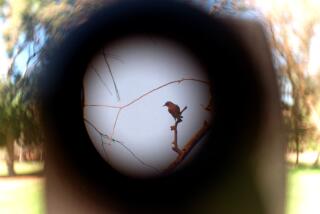Indian Is Fighting for a Child’s Soul : Use of Social Security Number Will Cause Daughter ‘Great Evil,’ He Says
- Share via
BELLEFONTE, Pa. — As government officials see it, all they want from 5-year-old Little Bird of the Snow is her Social Security number. But, to the child’s father, the government is after her very soul.
In a struggle that is about to go before the U.S. Supreme Court, Stephen Roy has refused to give the Pennsylvania Department of Public Welfare his daughter’s Social Security number, which his wife mistakenly procured. The number is required if help from the federal-state program of Aid to Families With Dependent Children is to continue.
Grandson of Chief
But Roy, the 29-year-old great-grandson of a chief of the Abnaki Indian tribe, fears that allowing Little Bird’s number to be plugged into a computer would harm the girl.
“We figure (that) in giving them this number we’d be cooperating with what we would call a great evil, in that they use this number in their computers,” Roy said. “In using these numbers, they dehumanize people. They rob them of their uniqueness.
“It would take a part of her spirit away, what people normally refer to as a soul. That’s what we call their spirit. To stay in good health, to be a strong person, you’ve got to have a lot of spirit.”
For the same reason, the family does not allow photographs to be taken.
The government insists that Social Security numbers are necessary to determine whether welfare applicants are eligible for aid and to prevent fraud and waste.
55,000 Other Roys
Government officials say that the Roys are a good illustration of how difficult it could be to check on recipients. In 1983, the Social Security computer system listed more than 55,000 people in the United States with the last name Roy and 32 with the name Stephen Roy.
In September, 1982, Roy’s cash assistance for Little Bird, up to $66 a month, and her medical benefits were halted because he refused to use her Social Security number.
In a lawsuit, Roy and Karen Miller, 26, his common-law wife of 10 years and the girl’s mother, said that the government, in cutting off assistance for Little Bird, violated their right to freely exercise their religion under the First Amendment.
U.S. District Judge Malcolm Muir ordered the payments reinstated in June, 1984, ruling that the Social Security requirement was unconstitutional in the case of Little Bird. He said the Roys had made a rare but authentic request for an exemption in the sincere belief that their child’s spirit could be endangered if the number were used.
Powers of Healing
The Abnakis, one of several tribes in northern New England linked by the Algonquian languages, believe that all efforts must be made to develop the spirit, which sometimes can lead to powers of healing.
“There’s only a few people that are born to that,” Roy said. “We don’t know if Little Bird is born to that or not. We won’t know until she discovers on her own. Until then, we feel that’s something we have to protect.”
Muir’s exemption extends until Little Bird’s 16th birthday, when, Roy said, she can decide for herself whether she wants to provide the number.
The government appealed Muir’s ruling to the Supreme Court, and oral arguments are scheduled for Tuesday.
Roy, Miller and their older daughter, Renee, 7, use Social Security numbers. Roy said he gave his to the government before he realized how numbers can be used. He said his spirit has already been stolen and it would be pointless for him to object now.
Little Bird received her number right after her birth, after the hospital in which she was born gave her mother an application. Miller says she does not remember signing it and, at the family’s request, the Social Security Administration declared the number dormant. Officials say it has not been used.
Roy said his decision not to provide Little Bird’s number to state and federal agencies was influenced by a traditional Abnaki chief whom he had heard speak in 1980 on how technology was stealing the spirit of man.
Troubled Youth
Roy, who was born in Concord, N. H., had turned back to his roots after a troubled youth.
As a teen-ager in Norfolk, Va., he was part of a gang called The Family and was using drugs and alcohol. He was placed in a foster home, didn’t like it and took off for Williamsport, Pa., a city he admired for its rustic beauty.
He worked at temporary jobs, including shoveling snow, carpentry and plumbing, but often has been unemployed since 1980. His benefits for Little Bird went up and down depending on how much money he made.
Roy, searching for a purpose in life, has entered college and is a junior at Pennsylvania State University, just south of this central Pennsylvania town, majoring in public service with a minor in sociology.
“I see it as a means of getting out of the welfare system,” he said. “I definitely want to go on and do something better than just sitting back all my life. I’d like to be able to help our people.”
Wears Hair in Braids
Roy, a muscular but soft-spoken and folksy man, wears his dark brown hair in braids, as is the Abnaki custom.
Miller, who was reared as a Baptist, said she does not agree with all of Roy’s beliefs.
“There are times,” she said, “where I feel some of these beliefs are a little far-fetched. But I respect them, and he is their father. As they grow, they’ll decide whether or not they want to follow in his footsteps.”
Little Bird of the Snow was given her name when Roy spotted a goshawk in the snow during a traditional ceremony to lay the root for the baby’s spirit.
“The government’s confirmed her uniqueness,” Roy said. “They’ve run her name through their computers and they haven’t found anybody else with that name.”
More to Read
Sign up for Essential California
The most important California stories and recommendations in your inbox every morning.
You may occasionally receive promotional content from the Los Angeles Times.










